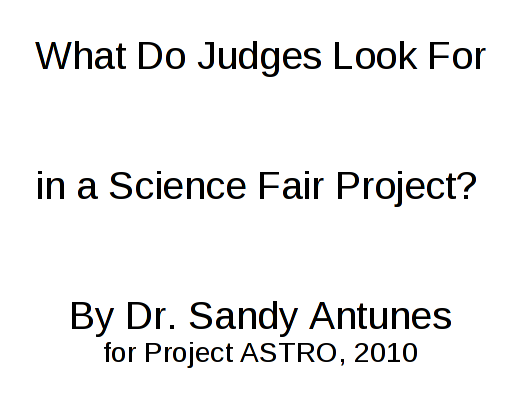But then again, I did say these were secrets. So making them hard to blog about sort of fits!
.... oh, but I do put a pure-text version at the end. Enjoy!
Alex
Astronomy&Science every Fridays, The Satellite Diaries every Tuesday, and twitter @skyday













... and now, in pure text...
What Do Judges Look For in a Science Fair Project?
By Dr. Sandy Antunes for Project ASTRO, 2010
Question
Something that makes you go, 'Huh... interesting!'
... then go do research and come up with what you think will happen (the Hypothesis) and a plan (the Experiment)
A simple idea done well is much better than a complex mess.
Hypothesis
* This is what you think the answer is.
* Be Specific!
* Do some research, then guess!
* It needs to be testable!
* The Hypothesis is just a starting point.
* Don't be afraid to be wrong!
Examples
Bad:
“Different weights will fall at different speeds”.
Better:
“Heavy stuff will fall faster than light stuff.”
Best:
“An item that weights twice as much will fall twice as fast.”
Note-- all 3 of those are actually 'wrong'-- but they're great Hypotheses!
Materials
* Just list what you used.
* Give amounts: “2 lemons” is better than just “lemons”.
Procedure:
* Just list what you did. Easy-peasy.
Variables
Independent variable:
what you're changing
example: 'weight of falling object'
Dependent variable:
what you're measuring
example: 'how long to fall'
Controlled variables/Constants:
things that might affect the experiment that you don't otherwise care about,
examples: 'height of fall', 'temperature of room'
Data
Include a table, a graph, or BOTH!
Show all data, not just the 'good' results
Photos are optional but helpful-- or draw a cartoon or figure.
Use numbers, not descriptions:
Bad: cold, warm, hot
Good: rating 1-10 where 1 = coldest, 5 = lukewarm, 10 = hottest
Results
Sum up what the data did. (Graphs help).
Give totals, tallies, averages-- also highs and lows!
Example: 0,10,20: average=10
10,10,10: average=10
... but clearly these sets are different!
Conclusion
Was your original Hypothesis proven
right, wrong, or couldn't tell?
Don't just say “I was right/wrong”. How so? How much?
This is your chance to use adjectives:
'strong','weak','big','little','quick','slow'
weak effect, strong change, little difference, slow growth.
Layout Tips
* Simple layout, good content
* Don't need lots of words (this poster is too wordy)
* Any photos help.
Questions I ask as a Judge
* How do you come up with the idea?
* What other things might have caused your results?
* If you had to do this experiment again, what would you change, add or improve?
* How is your result useful to others?
Alex
Astronomy&Science every Fridays, The Satellite Diaries every Tuesday, and twitter @skyday





Comments